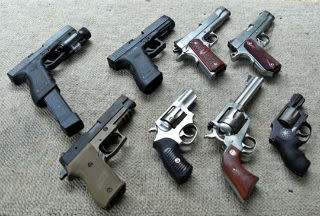Federal court overturns D.C. open carry ban

“
A well regulated Militia, being necessary to the security of a free State, the right of the people to keep and bear Arms, shall not be infringed.” – The Second Amendment
Last Saturday, the U.S. District Court for the District of Columbia ruled that the city cannot prohibit individuals from carrying firearms in public.
Plaintiffs brought their case before the court after their permit applications—stating such an intention—were revoked.
The District of Columbia currently prohibits the possession of firearms except in cases where individuals hold an issued certificate for the firearm. However, besides retired police officers, residents may only seek registration “for use in self-defense within that person’s home,” effectively barring the issuance of permits for carrying firearms in public.
In pleading their case before the court, plaintiffs argued that such restrictions amounted to “a complete ban on the carrying of handguns in public by almost all individuals.” They disputed the restrictions as unconstitutional.
“Every law-abiding person should be able to exercise their fundamental right to self-defense, which as the court in this case correctly noted, is not confined to the home,” Chris W. Cox, chief lobbyist for the National Rifle Association, told the Washington Post.
The court’s decision relied heavily on District of Columbia v. Heller (2008), in which the Supreme Court struck down the city’s firearm possession ban. Writing for the majority, Justice Antonin Scalia argued that the Second Amendment applied specifically to individuals and that, during the eighteenth century, the phrase “‘bear arms’ was unambiguously used to refer to the carrying of weapons outside of an organized militia.”
Though the Supreme Court has not dealt specifically with public-carry prohibitions, other federal courts such as the Ninth Circuit have interpreted the Court’s definition of “bear Arms” to necessarily apply to public spaces outside the home. The D.C. court concurred, employing the same contextual and historical meaning of “bear Arms” as to “carry for a particular purpose confrontation.”
The District’s top lawyer has already requested a stay on the federal court’s ruling, asking on Monday that the court delay implementation for 180 days while it seeks an appeal.
The case comes at a time when the Supreme Court has mostly refused to hear cases concerning the Second Amendment. In the most recent case, decided in 2010, the Court held that states, not just the federal government, must guarantee an individual right to gun ownership.
Adam Winkler, a professor of constitutional law at the University of California, Los Angeles, speculates on why the Court avoided the issue during the 2013-14 term:
It’s long been suspected that [swing Justice Anthony] Kennedy signed on to the earlier Second Amendment rulings by the court only after language was inserted allowing for reasonable restrictions on guns. But the question has lingered: How far would Kennedy allow gun control to go?
That question might well have been on the minds of the other justices when they voted not to hear a Second Amendment case this year. With four justices likely in favor of broad Second Amendment rights and another four likely opposed, the scope of the right to bear arms turns on Kennedy. His views may have been sufficiently unclear that neither side wanted to take a risk of a landmark decision coming out the wrong way.
Nevertheless, it is unclear how long the Supreme Court can continue to avoid the issue. The D.C. court’s ruling may yet prove too great an opportunity to weigh in.
Matt George is an intern at the National Constitution Center.
Correction (July 30, 2014): An earlier version of this story misidentified the court whose ruling is discussed. It is the U.S. District Court for the District of Columbia, not the U.S. Court of Appeals for the D.C. Circuit.
Recent Stories on Constitution Daily
Constitution Check: Is suing the president merely a rehearsal for impeachment?
Former CNN anchor leads charge against New York teacher tenure laws

